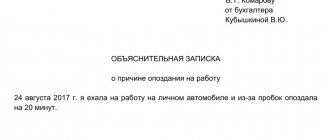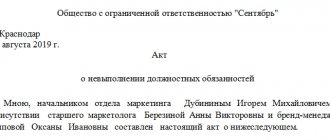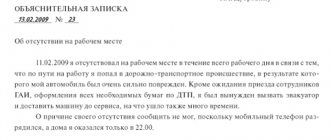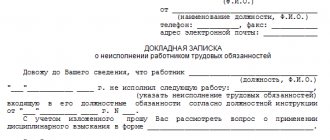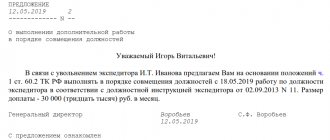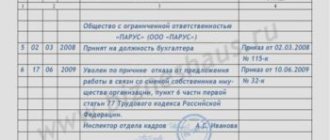Home / Labor Law / Dismissal and layoffs / Dismissal
Back
Published: 06/15/2016
Reading time: 8 min
0
3368
The Labor Code (Article 192) stipulates the employer’s right to bring disciplinary liability to employees who do not fulfill their labor duties.
When choosing the type of penalty, you should proceed from the severity of the violation and the scope of the consequences that arose in connection with its commission.
You cannot be fired for a minor violation; a more lenient punishment must be applied..
The possibility of dismissal for such offenses, as well as methods of its use, are fixed in Art. 81 Labor Code of the Russian Federation.
This article states that an employer can terminate an employment relationship with an employee if there is a documented repeated failure to fulfill job duties (for the previous fact of non-fulfillment there must be an outstanding penalty) or for a single gross violation.
The list of gross violations set out in the above article is exhaustive; no other violations can be dismissed on this basis.
Although, this list indicates, rather, cases of violation of labor discipline and legislation, rather than failure to fulfill labor duties. Therefore, it can be considered that an employee cannot be fired immediately for failure to fulfill his duties; it is necessary to establish the fact that this phenomenon is repeated .
- Range of duties
- How and who determines that an employee is not coping with his duties?
- Dismissal procedure Documentary recording
- Carrying out inspection activities
- Obtaining an explanation from the employee
- Issuing an order to impose disciplinary liability
- Further actions
Internal documentation
When a person gets a job, it is considered a priori that he will comply with labor discipline, as well as fulfill his duties and maintain subordination. But this is a theory.
Practice shows something completely different: employees deliberately evade their work, do it in bad faith, and with poor quality. Then the employer asks the question, what should he do if his job duties are performed carelessly?
This is why the above documentation is needed. It must clearly describe the responsibilities of each employee. And before signing the contract, the applicant needs to read the documentation.
- First, a job description is needed to describe the responsibilities. If there are no instructions, then figuring out how to fire someone is possible, but difficult. The employee will go to court, where he can prove that there were no specifics in the contract. And the employer will bear responsibility.
- Rules are needed that describe the internal work schedule; it describes how much employees should work and rest. When they can eat, when the work day begins, ends, work schedule and schedule, while the latter can be for departments or for the entire organization.
- An agreement for the entire team, which approves the documentation in terms of bonuses and wages.
How to determine whether an official is fulfilling his duties? This can only be done if there is a specific installation, if the manager has recorded this fact. Or employees. Or clients. Due to the lack of instructions, the employer may suffer. Because there are no specifics, there is no corpus delicti.
Aspects of law
Dismissal for improper performance of official duties is regulated by Article 81, part 1:
If the employee has repeatedly ignored his duties, no valid reasons have been provided, and there is an outstanding penalty. If repeatedly ignored. If the collection period has not expired. The punishment is as follows:
- If you fail for the first time, then the reprimand is verbal.
- If several times, then a reprimand.
Repeated violation of any kind of rules or instructions. At the same time, the internal regulations must also contain a list of all these gross violations:
- Absenteeism or absence from work without the permission of the boss and a valid reason, if more than 4 hours have passed or during a specific time/shift.
- The employee arrived drunk.
- Told other people a trade secret.
- He stole someone else's property that was located on the territory of this enterprise.
- Safety standards were violated, resulting in a disaster, accident or threat to life.
It is necessary to document the fact of non-fulfillment of duties. Such documents may be:
- Memo from the head of the unit. Or an official one from him.
- Log of arrivals and departures, security log.
- Work sheet and other data.
- Confirmation by a narcologist of the appearance of an employee in a drunken state.
- Any documents that can confirm the transfer of trade secrets.
- Confirmation of theft, for example, taking inventory, holding the employee accountable, proving his guilt.
Important
However, the employee has the right to provide his explanations and he can be rehabilitated. If an explanatory note was not taken from the employee, and the employer broke off the relationship, then this is considered illegal.
What constitutes negligence from a legal point of view?
The Criminal Code of Russia (hereinafter referred to as the Criminal Code of the Russian Federation) states that negligence is a crime that must be punished, especially if, as a result of its commission, the injured party suffered moral, material, or physical damage. In simple terms, this is a failure to perform or improper performance of job duties due to a negligent and dishonest attitude towards work.
How to determine that an employee cannot cope with his duties
If an employee does not want to work and does it carelessly, then any employee can become an initiator and write a memo. Or a report. These notes are written to the manager, who must respond to them. Here's what the result depends on:
- Are the claims really justified?
- Is there concrete evidence?
- Does the note writer have the necessary qualifications to determine the quality of the work?
- Has the organization been harmed and what?
- Did the employee have previous achievements?
- How valuable is he as a professional?
- Is it possible to compare the damage caused to these qualities?
- Why did the employee act this way?
- The manager's attitude to this situation.
Interesting
Most often, department heads and managers can evaluate an employee’s performance. Or the workers who are responsible for safety in production.
Disciplinary action
The contract has certain obligations that must be fulfilled, as well as other established norms, as established in Article 21 of the Labor Code. Article 22 states that the manager may require that all duties specified in the contract be fulfilled. For failure to fulfill or poor fulfillment of obligations, the subordinate is subject to disciplinary action.
There are 3 penalties, as stated in Article 192:
- First a remark is made.
- Then a reprimand is imposed.
- If all else fails, the employee is fired.
It all depends on how serious the offense is. If the reason for dismissal can be considered insignificant by the court, the employee will be reinstated. The legislation clearly defines these penalties. No others can be used. For example, a person cannot be deprived of a bonus for absenteeism. Although in practice this happens all the time. In Art. 193 spells out how to properly hold an employee to such a measure of responsibility. If the manager decides to impose a punishment, he must remember that for one violation the penalty is imposed only once.
Dismissal
In order to fire an employee for failure to fulfill official duties, certain steps must be strictly followed:
- First, information must be received that violations have occurred.
- After which the situation must be recorded in writing.
Warning
If an organization is liquidated or downsizing occurs, the employer is obliged to warn employees about this. Everyone is given a warning, and this is done 2 months before the date of dismissal, and the employee is required to sign.
You can terminate an employment contract without notice. To do this, the employee must agree to this in writing. And he will be paid compensation in 2 months.
If the number of employees is being reduced, the employer must provide the employment service with all the necessary data.
- The personal file is checked to see whether it has been collected, whether it has been repaid or not.
- A decision is made on how serious the action is. Most often this is decided collectively or a commission is assembled. A trade union may also be involved.
- After which a decision is made that the person needs to be fired, and a corresponding order is issued, the employee must be made aware of it.
- They issue a work book and payments.
If the procedure is not followed, the dismissal may be considered illegal. And the employer may be held liable with material costs.
Fact
It is imperative to record the fact of the employee’s negligence.
Explanatory
An employee can pull a trick, but no matter how management looks at it, an explanation must still be taken. The memorandum is not enough, Art. 193 speaks about this. TK. The manager informs the employee orally, or preferably in writing, that he wants to receive an explanation. After which the employee must write what he is asked to do within 2 working days.
This is also important to know:
Article 33 of the Labor Code upon dismissal
If the deadline has expired and the employee has not written anything or has written a refusal to provide an explanatory note, the manager makes a decision. Or the commission does it. No more than a month must pass from the date of violation.
Some employees refuse to provide an explanation; it is better for the manager to wait 2 days. Then the court will understand that the leader met halfway and gave the person time to think.
Disciplinary order
When the training has already been completed, the HR department will be able to make an order that a disciplinary sanction be imposed on the person or he will be fired, because. the person does not fulfill his duties. The boss, when signing the order, is obliged to take into account all factors: how serious the violation was, the degree of guilt, the circumstances of the case. A reprimand may be replaced by a remark. If the situation in which the violation occurred is repeated, and there has already been a penalty in the personal file, then the specialist will be fired. Then the employer refers to the fact that the person systematically ignored his duties.
Employment history
Dismissal under an article for failure to fulfill official duties must be recorded in the work book. It depends on the reason for dismissal. Other employers look at these records, and the consequences can be detrimental. If a person is threatened with dismissal for failure to fulfill his duties, and he understands this, it is possible to negotiate with the employer to change it at his own request. So as not to spoil the work record.
Recording in documents
All facts of violation d.b. recorded:
- The act that a person has violated discipline.
- Customer complaints.
- Testimony of other employees.
- Conducted inventory.
- Recordings made by surveillance cameras.
- Expert reports.
- Other documents.
The legislation does not indicate how to correctly record failure to fulfill obligations. But it is necessary that the guilt of the person being dismissed be clearly proven. Otherwise, the employer may face legal proceedings.
Procedure for terminating an employment contract
So, when an employee commits a disciplinary offense (that is, if he fails to fulfill his labor duties) and if he wants to dismiss such an employee, the employer should first check the existence of a valid disciplinary sanction (find out whether it has not been removed or extinguished), as well as the legality of its application (established whether the labor duty, for failure to fulfill which the employee was subjected to punishment, was properly followed, whether the procedure for bringing to disciplinary liability was followed). For example, an employee was reinstated in his previous position and wages were recovered from the employer for the period of forced absence, since the disciplinary sanctions previously applied to the plaintiff at the time of his failure to fulfill his work duties without good reason were lifted and canceled ( Appeal ruling of the Murmansk Regional Court dated May 14, 2014 No. 33-1329 ).
